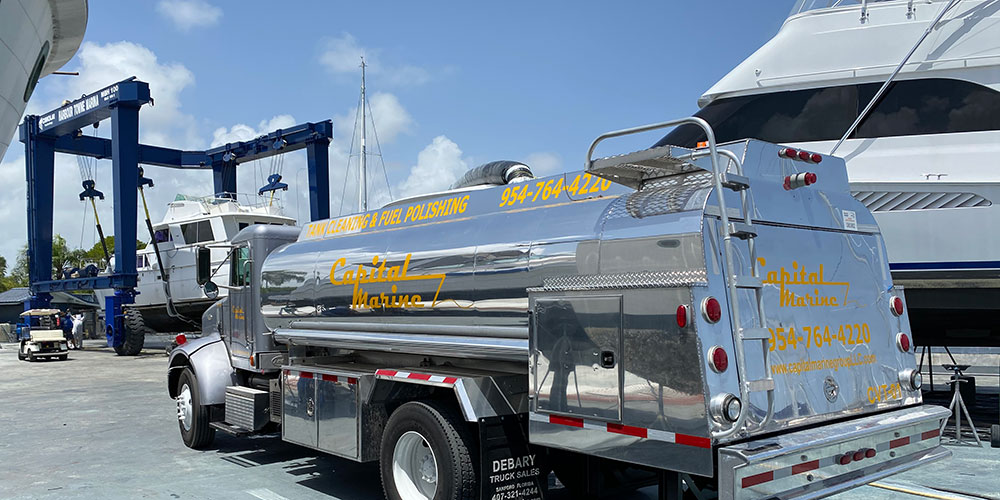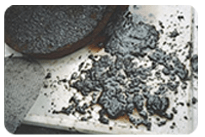FUEL TANK CLEANING & FUEL POLISHING
The most common reason for marine diesel engines in general, and recreational trawler diesel engines in particular, to fail to run is associated with "bad diesel fuel." Fungi growth and moisture contamination within fuel tanks is a common and annoying problem that can lead to fuel system damage and costly downtime and disposal problems.

OLD FUEL
 The two biggest ways to ruin a tank of fuel-on a diesel or gasoline powered yacht-are water contamination and long-term storage.
The two biggest ways to ruin a tank of fuel-on a diesel or gasoline powered yacht-are water contamination and long-term storage.
When you keep fuel stored and unused for more than three months, Diesel starts separating and a substance akin to crude oil settles to the bottom of the tank, if the fuel Diesel is kept for a year or more, it most likely lost the burning power, the diesel smells like “varnish” and your engines are going to start smoking all the time. Diesel that old should be removed from the vessel and the fuel tanks should be cleaned by professionals.The most common problem is prematurely plugged fuel filters and plugged water separators. In severe cases, the fuel line can become partially or totally blocked.These conditions can lead to unanticipated engine stoppage which can be a serious problem especially if your are navigating in tight areas or in bad weather.The problem is particularly severe in fuel tanks where the algae mat traps both moisture and acid against the tank surface. If undetected, serious tank damage can result.
WHERE DOES CONTAMINATION COME FROM?
When diesel leaves the refinery, it is clean, with acceptable water content. Every stop the fuel makes on its way from the refinery to your boat is an opportunity to pick up algae and water. By the time it reaches your tank, the fuel has become contaminated to some degree. The problem can become worse in your tank if water is present or condensation is allowed to accumulate. The darkness of a fuel tank, especially in warm climates, is the ideal environment for algae growth. Most boaters, who are aware of the problem algae can cause, use a biocide which will effectively kill the organisms but will not eliminate the contamination problem. The algae skeletons, along with dirt and rust that may have been trapped in the algae mat, fall to the tank bottom as sludge.
Diesel fuel can easily become contaminated with microorganisms such as bacteria, fungi, yeast, rust and mold.
 This contamination can clog your filters and shut down your engines. Having your engines shut down from clogged fuel filters can really ruin an otherwise enjoyable outing, but it could really get bad if you have them shut down while trying to navigate in high seas or critical situations.
This contamination can clog your filters and shut down your engines. Having your engines shut down from clogged fuel filters can really ruin an otherwise enjoyable outing, but it could really get bad if you have them shut down while trying to navigate in high seas or critical situations.
Most of this contamination adheres to the walls and the bottom of the tanks and you might not notice a problem while running the engines at the dock. Once the boat is underway or in rough water, and the fuel begins moving around, the contamination tends to start breaking away from the walls of the tank, becomes suspended in the fuel causing plugged filters and motor operation. Biocides can be very effective in killing off “algae”, however, the dead organisms accumulate in the bottom and walls of the tank.
Fuel management isn’t just a matter of safety. With the wildly fluctuating prices of fuels likely to remain a reality in the coming seasons, anything you can do to increase the efficiency of your engines, as well as the reliability of the fuel supplied to your engines, needs to be carefully considered.
 HOW DO YOU TREAT THE PROBLEM?
HOW DO YOU TREAT THE PROBLEM?
If you are experiencing motor problems or are frequently changing filters, immediate relief can be obtained by having your tank professionally cleaned. The cleaning process is typically done by agitation and filtration. Tanks should be 1/4 to 1/2 full. If significant bottom water is present, it should be pumped off first. It is very important that the fuel cleaner creates significant turbulence in the tank. It is this action that cleans the tank and puts the bottom sludge in suspension with the fuel so that it can be removed by the filtration unit. It is important to note that just pumping off the fuel will not solve the problem. All the sludge will remain in your tank bottom to contaminate the new fuel pumped into your tank.
 CAPITAL MARINE GROUP
CAPITAL MARINE GROUP
We have the technical knowledge and experience to successfully clean the most difficult tanks. With 25 years of success in the fuel tanks cleaning business, we can provide the most efficient way to clean your diesel tanks.
CAPITAL MARINE GROUP DOES NOT JUST “POLISH” THE FUEL, our unique system is based in actually getting inside the fuel tank (through any opening such as inspection plate, sending units etc.) and pump ALL the fuel out of the tanks to our trucks, then we spray the diesel fuel at 60-80 lbs of pressure inside the tanks to assure that all the “sludge” is being removed, after doing so several times and making sure the tank is clean by continuously taking fuel samples, we re-fuel the vessel through 1 micron filters.
Our exclusive system cleans the interior of the tank, removing all the sludge and debris, plus the filters will remove particles below 1 micron assuring that both, tanks & diesel are in optimal shape.
